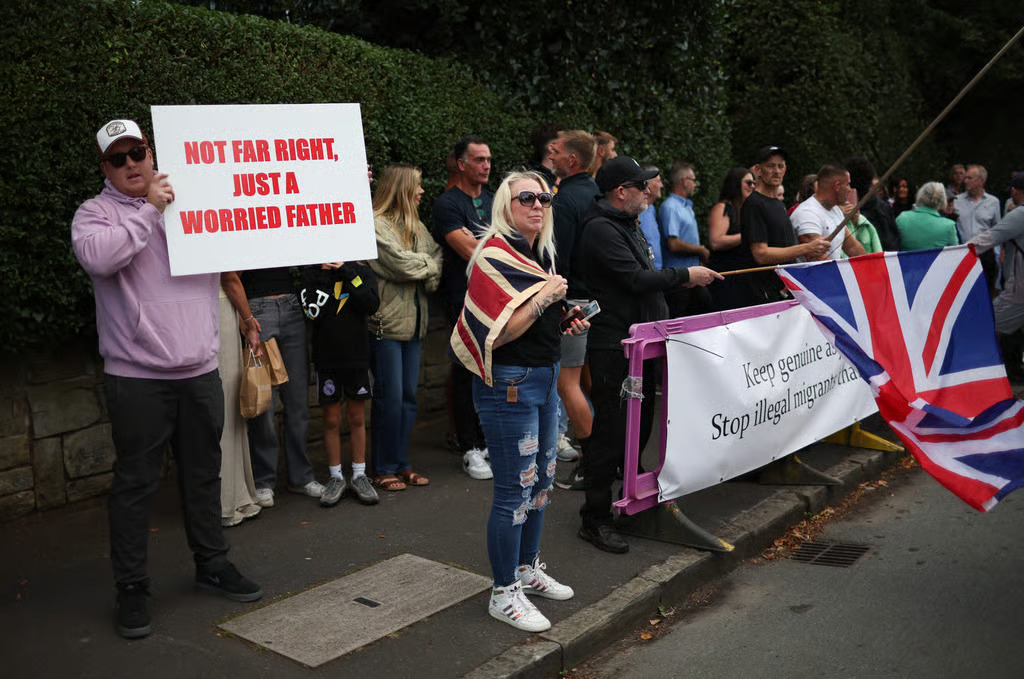Nigel Farage is placing a big bet on migration as the defining issue in British politics, but his strategy comes with major risks. As protests outside hotels housing asylum seekers erupt across the country, Farage’s Reform UK party is facing pressure from two sides. On one hand, his growing base of moderate voters wants measured policies. On the other, a more radical wing expects tough rhetoric and solidarity with those taking to the streets. Balancing the two could determine whether Farage’s surge continues or begins to stall.
Recent demonstrations in towns like Hoylake and Epping have drawn not only residents but also far-right groups such as Britain First, Homeland, and figures linked to Tommy Robinson. Some of these protests have turned tense, sparking accusations that Reform UK is too close to extremists. Farage has insisted that the majority of demonstrators are “genuinely concerned families,” blaming violence on “a few bad eggs.” His deputy, Richard Tice, has echoed that line, stressing that the party supports all lawful, peaceful protests as a core part of democracy.
Yet this stance leaves Reform UK in a difficult position. The party has worked to distance itself from overt racism and from controversial figures like Robinson, but it risks being defined by the very protests that have been dominated by hard-right voices. Analysts warn that Reform’s success has come from broadening its appeal well beyond Farage’s older outfits, with many of its new supporters being younger, more moderate, and less interested in culture war politics.
Tensions have grown since Farage’s outspoken defense of Lucy Connolly, a woman jailed for stirring up racial hatred by urging people online to set migrant hotels on fire. While Farage has portrayed her as a victim of government overreach, polls suggest that a majority of voters, including some Reform supporters, want politicians to distance themselves from her. Cabinet ministers attacked Farage’s U.S. trip to denounce British online safety laws, calling it an attempt to “talk Britain down.”
Reform has also faced criticism for its messaging on deportations. The party floated the idea of returning Afghan asylum seekers through an agreement with the Taliban, but polling shows nearly half of Britons see such a policy as unacceptable. Questions about deporting children further highlighted the difficulties: Reform chairman Zia Yusuf suggested unaccompanied minors could eventually be removed, only for Farage to retreat and insist that would not happen in the first term of government. Even so, the party maintains that families may face deportation if a father is removed first, leaving “a choice to be made.”
Despite these controversies, Reform UK is still riding high in the polls. Migration remains one of the top concerns for British voters, and Farage is eager to channel that frustration. Tice has compared asylum arrivals to “an invasion double the size of the British Army,” language critics say comes dangerously close to far-right framing. He has even suggested that groups of men could form neighborhood patrols to protect women near asylum-seeker hotels, though opponents argue such remarks risk encouraging vigilantism.
Farage’s challenge is clear. To maintain momentum, he must convince the broader electorate that his party offers firm but fair solutions on migration, without appearing tied to extremism. At the same time, he cannot afford to alienate his harder-line base, which continues to push for uncompromising measures. How Reform UK manages this balancing act could shape not only its future, but also the wider direction of Britain’s political debate on migration.

